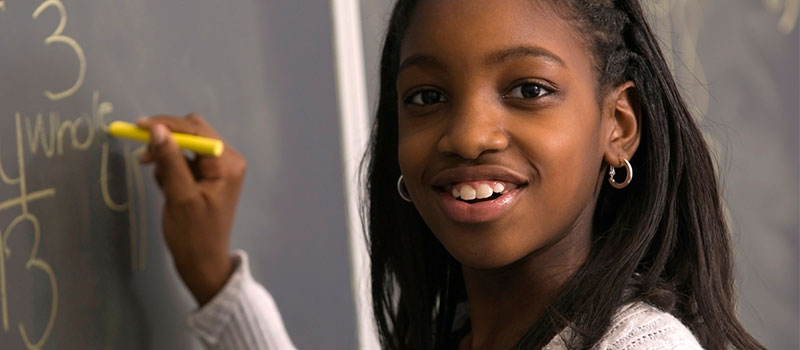African-American girls face school suspension twice as often as white boys and five times as often as white girls. Even though African-American girls only make up 16 percent of the entire female school population, they are given 28 percent of referrals to law enforcement and account for 37 percent of arrests. White girls, who make up 50 percent of the female school population, only account for 34 percent of referrals and 30 percent of arrests.
These numbers do not add up.
From minor infractions to arrests, African-American girls face higher rates of punishment across multiple public systems, including schools. A recent study from Georgetown Law’s Center on Poverty and Inequality, Girlhood Interrupted: The Erasure of Black Girls’ Childhood, offers new insights on a major contributing factor to this issue. Given that earlier research on the disproportionate discipline rates for African-Americans has focused primarily on boys, this new study has important information for school board members and any school officials who work with African-American girls.
Researchers from Georgetown examined a national survey of 325 adults from different racial and ethnic backgrounds to assess adults’ perceptions of race and gender, focusing on girls. The authors found that, compared to white girls, adults view African-American girls as older than they truly are; in less need of nurturing, support, comfort or protection; more independent; and more knowledgeable about adult topics, including sex.
These skewed perceptions — referred to as “adultification” — might explain why African-American girls face a greater level of discipline when compared to their peers. Adultification bias is especially prevalent for girls ages 5–14. African-American girls ages 15–19 are also subjected to these preconceived notions, but to a lesser extent than their younger counterparts. No bias differences were found for girls aged four and under.
“These findings show that pervasive stereotypes of black women as hypersexualized and combative are reaching into our schools and playgrounds and helping rob black girls of the protections other children enjoy,” said report coauthor Jamilia Blake, an associate professor at Texas A&M University, in a press release about the study.
In addition to alarming consequences in other public systems including juvenile justice and child welfare, the authors noted that this adultification bias leads to issues surrounding sexual harassment and assault. Because officials see African-American girls as more knowledgeable about adult topics like sex and in less need of nurturing, these girls face blame and criminalization when they become victims of sexual harassment or assault. The results of these stereotypes surrounding African-American girls can be extremely damaging.
The study’s authors recommend that school officials receive training to counter any inherent bias they may hold toward African-American girls. CSBA has collected a few resources to aid trustees in their advocacy efforts to fight this adultification bias and ensure African-American girls receive an equitable education.
CSBA Resources:
CSBA Blog Post: The Demographic Divide — African-American Students in Focus in California (May 2016)
Other Resources:
Black Girls Matter: Pushed Out, Overpoliced, and Underprotected — African American Policy Forum and Columbia Law School’s Center for Intersectionality and Social Policy Studies
Black Minds Matter: Supporting the Educational Success of Black Children in California — The Education Trust-West
Through Our Eyes: Perspectives and Reflections From Black Teachers — The Education Trust





